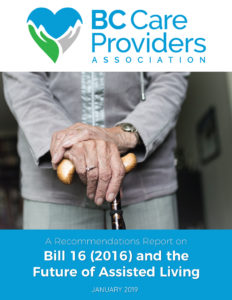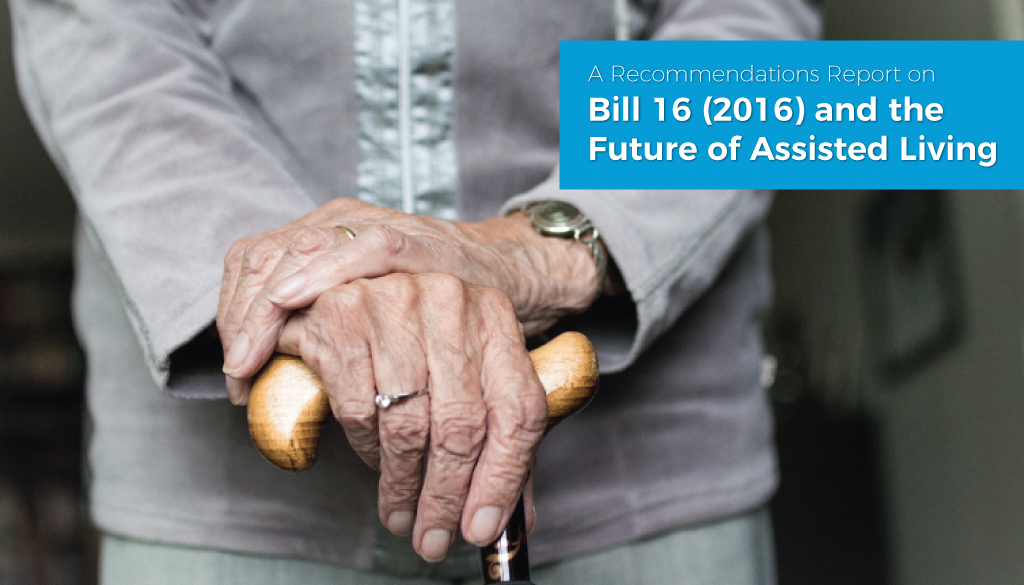Burnaby, B.C. (January 23, 2019) – BC Care Providers Association (BCCPA) publicly released today its report on the shifting landscape of assisted living in British Columbia titled “A Recommendations Report on Bill 16 (2016) and the Future of Assisted Living.” The report outlines 10 top-line recommendations which speak to funding, staffing and infrastructure, the use of technology, and B.C.’s overall approach to assisted living.
The paper recommends that the Ministry of Health review the assisted living funding model, both to accommodate for the current needs of seniors who live in assisted living homes, and to ensure that B.C. is prepared for incoming legislation (Bill 16, 2016) meant to address frailer and more complex clients coming to assisted living housing in the future.

“There have been many changes in B.C.’s assisted living homes over the last decade,” says BCCPA CEO Daniel Fontaine. “Clients are ten per cent more likely to be over the age of 90, and are more likely to be living with some kind of cognitive impairment. These demographic changes, along with legislative changes, are in the process of changing B.C.’s assisted living landscape. It is important that government, BCCPA and providers work together to ensure that funding and policy keep pace.”
Through these recommendations, BCCPA suggests that the Ministry work with care providers and other key stakeholders to determine what funding is needed to ensure that adequate and appropriate staffing levels are in place, and determine what resources are necessary to update infrastructure which no longer meets the needs of residents with greater accessibility needs.
“This report – which represents almost two years of intensive consultations – seeks to thoroughly understand any changes experienced by assisted living providers, as well as addressing the concerns which they foresee in relation to Bill 16. We look forward to working with the Ministry of Health, Health Authorities and other stakeholders to ensure the successful implementation of these regulatory reforms,” adds Fontaine.
In 2016, the BC Ministry of Health announced upcoming changes to the Community Care and Assisted Living Act (CCALA) via the Community Care and Assisted Living Amendment Act, 2016 (Bill 16). These changes were supported by BCCPA who had made previous recommendations to this extent.
Historically, the CCALA has permitted assisted living residents to be supported by no more than two prescribed personal services. Under the legislative changes, the limit of two prescribed services will be removed, enabling more people to qualify (and continue to qualify) for funded assisted living, provided that residents:
- Can make decisions on their own behalf or live with a spouse who can make decisions on their behalf;
- Can recognize an emergency, take steps to protect themselves in an emergency or follow directions in an emergency;
- Do not exhibit behavior that jeopardizes the health and safety of others, and;
- Do not require continual unscheduled professional health services.
A special Assisted Living Task Force was struck in the spring of 2017 to review Bill 16, and resulted in BCCPA bringing together an assisted living working group to develop the final recommendations outlined in the report. The development of this paper was also overseen by BCCPA’s Board of Directors.
This report follows a policy motion made at BCCPA’s November AGM stating:
That the B.C. government review the assisted living funding model as to determine the most appropriate funding approach, allow for consistency within the sector, decrease https://bccare.ca/wp-content/uploads/2022/08/medcare-img22.jpgistrative burden, and increase flexibility to support the continuum of care for seniors.
-30-
MEDIA CONTACT: Rebecca Frederick, Manager, Public Affairs, Home Care & Assisted Living, 604-736-4233 ext 243, rebecca@bccare.ca




